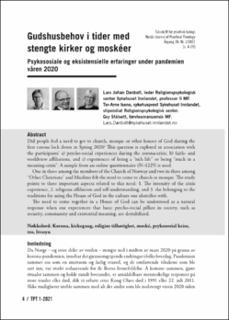Gudshusbehov i tider med stengte kirker og moskéer : psykososiale og eksistensielle erfaringer under pandemien våren 2020
Peer reviewed, Journal article
Published version
Permanent lenke
https://hdl.handle.net/11250/3052282Utgivelsesdato
2021Metadata
Vis full innførselSammendrag
Abstract Did people feel a need to get to church, mosque or other houses of God during the first corona lock down in Spring 2020? This question is explored in association with the participants’ a) psycho-social experiences during the corona-crisis, b) faith- and worldview affiliations, and c) experiences of living a “rich life” or being “stuck in a meaning-crisis”. A sample from an online questionnaire (N=1225) is used. One in three among the members of the Church of Norway and two in three among “Other Christians” and Muslims felt the need to come to church or mosque. The study points to three important aspects related to this need: 1. The intensity of the crisis experience, 2. religious affiliation and self-understanding, and 3. the belonging to the traditions for using the House of God in the culture one identifies with. The need to come together in a House of God can be understood as a natural response when one experiences that basic psycho-social pillars in society, such as security, community and existential meaning, are destabilized. Nøkkelord: Korona, kirkegang, religiøs tilhørighet, moské, psykososial krise, tro, livssyn

